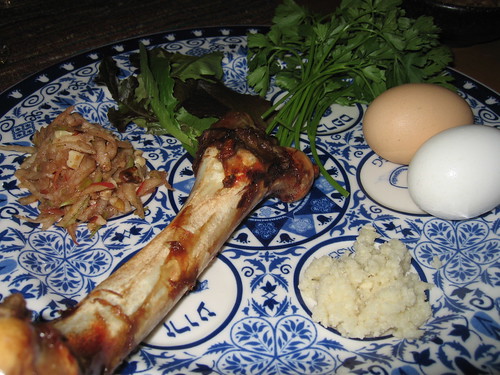But what about that other command? You know the one:
They shall eat the flesh [of the Passover lamb] that night, roasted on the fire; with unleavened bread and bitter herbs they shall eat it. Do not eat any of it raw or boiled in water, but roasted, its head with its legs and its inner parts. (Ex. 12:8-9)So how about it--why don't [some] Jews today eat lamb on Passover? [See the note below!] Well, these verses only tell part of the story. If you continue reading on, you'll discover that the Torah has more to say on the matter.
First, keep in mind that what makes the pesach a pesach (and not just a lamb) is that it is a korban (Num 9:7), a word which is strongly connected to offerings made on the altar in the mishkan (Tabernacle/Tent) in the wilderness. (A good Biblical lexicon should confirm that the word pesach refers not just to the lamb, but to the sacrificed lamb. In other words, pesach is an abbreviation for korban pesach.)
Thus, when the children of Israel celebrated the first Passover in the desert (see Numbers 9), they would have offered the korban pesach on the altar in the mishkan. (In fact, Rashi inferred that the korban pesach was only offered the first year and wasn't offered again until the Israelites had entered the land of Israel.)
In the concluding book of the Torah, Deuteronomy, we find Moses instructing the children of Israel:
Take care that you do not offer your burnt offerings at any place that you see, but at the place that the LORD will choose in one of your tribes, there you shall offer your burnt offerings, and there you shall do all that I am commanding you. (Deut. 12:13-14)Moses even specifically addresses the korban pesach in chapter 16:
You may not offer the Passover sacrifice within any of your towns that the LORD your God is giving you, but at the place that the LORD your God will choose, to make his name dwell in it, there you shall offer the Passover sacrifice, in the evening at sunset, at the time you came out of Egypt. (Deut. 16:5-6)This is confirmed in 2 Chronicles 30, which describes how the korban pesach was offered in the Temple.
It seems that Yeshua and his followers also participated in this commandment:
And on the first day of Unleavened Bread, when they sacrificed the Passover lamb, his disciples said to him, "Where will you have us go and prepare for you to eat the Passover?" And he sent two of his disciples and said to them, "Go into the city, and a man carrying a jar of water will meet you. Follow him, and wherever he enters, say to the master of the house, 'The Teacher says, Where is my guest room, where I may eat the Passover with my disciples?' And he will show you a large upper room furnished and ready; there prepare for us." And the disciples set out and went to the city and found it just as he had told them, and they prepared the Passover. (Mark 14:12-16)I'm specifically noting (a) that they were in the city to make their preparations and (b) that Mark specifically mentions the sacrifice of the Pesach lamb (although of course he's mentioning it for symbolic reasons as well). (However, if their meal was not an official Passover seder (as John 18:28 seems to suggest), then of course they would not yet have eaten the korban pesach.)
Generally the offering of sacrifices in places other than the Temple is presented negatively in Tanakh--probably because of the connection to idolatry. Examples include the "unauthorized" sanctuaries at Dan and Bethel (1 Kings 12), as well as the "high places" mentioned throughout the Deuteronomistic history. You also get echoes of this in the prophets--mentioning Gilgal, Bethel, Dan, Beersheva--in Amos 4:4, 5:5, 8:14, Is. 4:15, Ezekiel 7:24--who refer negatively to "high places" and "sanctuaries."
The mandate to sacrifice the korban pesach in the Temple was retained by the rabbis of the Talmud, whose general reaction to the destruction of the Temple was to accept it as a (painful) judgment from God their father, who had thus made it impossible to offer korbanot. They believed that the proper response to this judgment was to make teshuvah and pray for the Temple's restoration, rather than attempting to sidestep God's discipline by ignoring the clear requirement of a Temple (Deut 12:13-14, 16:5-6) for offering korbanot.
According to Wikipedia, "the ritual is no longer performed today [in Judaism] except by certain minority groups generally regarded as heretical." The Ashkenazic tradition is to place a shank bone, known as a zeroa--on the seder plate--as a reminder of the korban pesach which we are unable to bring.
 |
| "Our Seder Plate" by Sam Felder, on Flickr |




